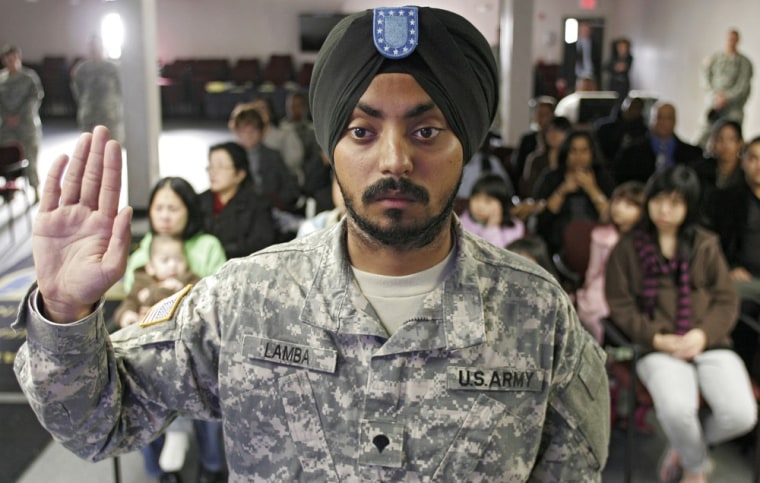The first Sikh to become an enlisted U.S. Army soldier in nearly three decades said Wednesday he's eager to move on to training as a combat medic and defend his new homeland on the battlefield.
Sikhism, a 500-year-old religion founded in India, requires its male followers to wear a turban and beard and keep their hair uncut. Army policies since 1984 had effectively prevented Sikhs from enlisting by barring those items.
But Lamba was granted a rare exception because he has skills the Army wants — the Indian languages Hindi and Punjabi.
Before him, two Sikhs joined the Army as medical officers earlier this year. But Lamba is the first enlisted man since the policy barring religious articles of clothing.
"When the bullets begin flying, it doesn't concern anyone what religion you are. I bleed the same color," said Spec. Simran Lamba, 26, after his graduation ceremony from basic combat training.
Lamba said his black turban, full beard, unshorn hair and religious beliefs posed no problems during his 10 weeks of training.
"I am proud to be a Sikh, I'm proud to be a U.S. citizen, and proud to be a U.S. Army soldier," he said.
During training, he wore a camouflage turban under his Kevlar helmet. He used petroleum jelly to get a tight grip between his beard and gas mask, and was able to keep his hair clean under all conditions, meeting all the military's concerns about training and appearance.
And besides, the Sikhs were founded as a warrior group meant to fight against injustice and inequality, Lamba said, so adopting Army values was easy for him.
"The Sikhs are warriors in Indian culture. Once our soldiers heard that, they were all for him," said Lamba's battalion commander, Lt. Col. Bryan Hernandez.
"It's going to be a good thing for our Army and our nation" to have Lamba in the service, Hernandez said. Lamba said he was treated like any other soldier.
The Army installation went to great lengths to educate his fellow soldiers, his commanders and anyone who would come in contact with him in order to make the transition go smoothly, said Maj. Gen. James Milano, Fort Jackson's commander.
"He met all requirements, he went through the training just like everyone else," said Milano.
Two hours before the graduation, Lamba also took his oath of citizenship along with a dozen other soldiers.
The native of New Delhi, India, was granted the honor of carrying a red-white-and-blue unit color flag as the 450 new soldiers paraded in a salute before 3,000 friends and family gathered in the stands.
Donning a uniform allowed him to fulfill a childhood dream of entering the military, Lamba said.
He came to the United States to get a master's degree in industrial engineering at New York University, and thought about enlisting and getting his citizenship. He did some research, and found that the Army's special forces units were allowed to wear beards, so it occurred to him that he might be able to enter the service.
Also, he'd read about a Sikh dentist and a Sikh physician who'd entered the Army recently, and he sought their guidance.
"I thought, why not fight for this country? It doesn't matter that I wasn't born here," Lamba said.
After enlisting, it took a 10-month Army review before the service granted him a waiver.
Lamba got some mentoring in advance of taking his big step, said Capt. Kamal Kalsi, a fellow Sikh and emergency room physician now based at Fort Bragg, North Carolina, who entered the Army in June.
"We talked a lot before he went in," said Kalsi, a 34-year-old from Riverdale, New Jersey. He said he wanted to come to Lamba's graduation to wish him well.
"Congratulations!" Kalsi said, after giving him a stiff Army salute, then beaming in pride at his colleague.
Lamba said he would have liked to be an officer like Kalsi, but since he wasn't a citizen, could not do so. After his four months of training as a combat medic, Lamba said he hoped one day to apply for officer candidate school.
He's happy to be an example for others to follow, Lamba said.
"I feel I am a soldier. I am not a civilian anymore," he said. "If I can do it, anyone can."
